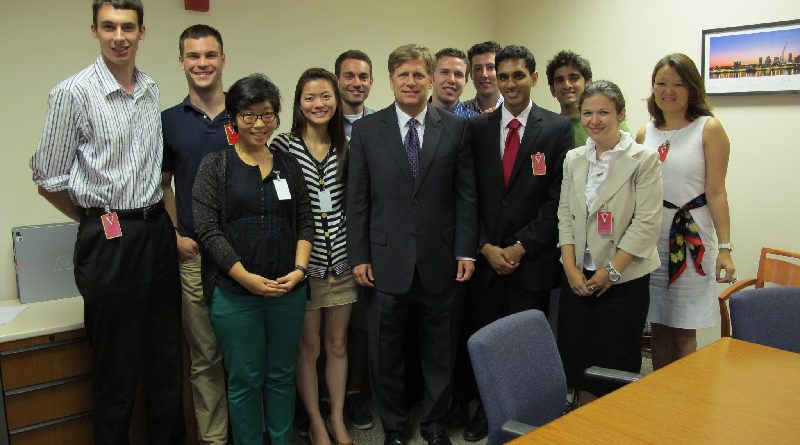Answers to Russian Aggression in Ukraine: International Law and the Power of Civilians and Civil Society
By Marija Tesla, MALD 2022 Candidate, The Fletcher School
I lived in Croatia until 1995 and escaped that summer in the back of a trailer that was attached to a tractor. I was fleeing from my grandparents’ farm as a seven-year-old girl, a daughter of a Croat and a Serb. During my journey, I received humanitarian help from the United Nations Protection Force (UNPROFOR), something I will never forget. After escaping, I lived in Serbia until 1999 as the war continued. I managed to leave that summer and arrived in Romania before heading to Akron, Ohio with the help of the United Nations High Commissioner for Refugees (UNHCR) in October 1999.
As a child of war, my imaginary friends were the nationalist leaders of the time. I spent my childhood trying to get them to a negotiating table in the hope that I could help to end the war. I held my own Dayton Accords many years before they happened. That experience is why I study international human rights law, humanitarian law, international criminal law, and focus my energies on atrocity prevention, protection of civilians, and helping refugees and others living within the margins of society.
There is nothing more tragic than war and the destruction it creates and brings; I wish it on no one. My biggest hope is for the Russian aggression against Ukraine to end. Knowing that this is not likely, I hope that UNHCR can establish “safe zones” to provide humanitarian assistance in Western Ukraine for those who are fleeing from this war. Cities like Khmelnytskyi and Lviv would be good destinations, however, creating a “safe zone” in Lviv would require Russia to discontinue its rocket attacks on the city. Doing this would also require “safe highways” to allow civilians safe passage. The longer one stays and lives through war, the greater the trauma and wounds that are inflicted, especially for children. Given the severity of what is happening on the ground, I hope that Ukrainians can leave as soon as possible to avoid both physical and psychological wounds.
As a student of international criminal law and human rights, the significance of Lviv is not lost on me. Also known as “the little Paris of Ukraine,” the city’s University of Lviv gave the world two great minds: Hersch Lauterpacht, an expert on crimes against humanity, and Raphael Lemkin, a leading genocide scholar. These great minds originated these two crimes in this city in Ukraine because of the horrors of war they witnessed. The current city of Lviv changed hands eight times between 1914 and 1945 and went from being called Lemberg, Lwów, Lvov, and now Lviv. While the horrors of war bring about the Lauterpachts and Lemkins who change the world for the better, it would be best if these horrors remained figments of the past.
I was in Moscow in 2012 when President Barack Obama attempted a “reset” to improve the relations between Russia and the United States. I experienced first-hand some of the major differences from when I was there in 2009 as a study abroad student in Saint Petersburg to 2012 when I was there with a group of fellow young leaders, each of whom were former or current presidents of their college’s student government associations.
Among an opportunity to speak with Russian opposition leaders, we also had the honor to meet with U.S. Ambassador Michael McFaul. After these conversations, it became clear that Russia was becoming more authoritarian as Vladimir Putin’s grip around Russian politics tightened. We met with the head of the United States Agency for International Development (USAID) Russia Office, Charles North, just before he and so many others were deemed “foreign agents” and kicked out of the country along with several other non-profit organizations. Even though many had criticized Ambassador McFaul for calling out President Putin and Russia for its intimidation of civil society and human rights abuses, I was grateful that he had.
Today, I believe that the end of the conflict in Ukraine may come down to the pressure placed on the Kremlin by Russia’s civil society in conjunction with the help of sanctions and pressures placed by private international corporations. For Ukrainians and the world, I hope the aggression, war crimes, and crimes against humanity end, and that President Putin stops falsely invoking the responsibility to protect (R2P) doctrine and falsely using genocide to justify infringing on sovereign territory and killing innocent civilians. With 39 States Parties to the International Criminal Court (ICC) referring the situation in Ukraine to the Court, it is clear that Putin is on the wrong side of history and that the international legal order believes that impunity is unacceptable. As war continues to affect citizens around the world, we must continue to strengthen the rule of law and uphold international norms and values. While the international legal order is not perfect, its basis is rooted in democracy, the value of human rights, and dignity of all; something worth protecting and fighting for not just in Ukraine, but in every corner of the globe.

